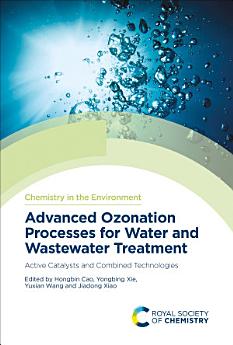Advanced Ozonation Processes for Water and Wastewater Treatment: Active Catalysts and Combined Technologies
About this ebook
Advanced Ozonation Processes for Water and Wastewater Treatment introduces the state-of-the-art catalysts used in catalytic ozonation and various combined processes with ozone. The reaction mechanisms, process kinetics, structure–property–activity relationships of catalysts, effects of operation parameters in these processes and the present state of practical applications and future trends are also discussed, making this a useful reference both for water treatment professionals and for those researching ozonation processes.
About the author
Hongbin Cao is a professor in Institute of Process Engineering (IPE), Chinese Academy of Sciences (CAS). He mainly works on whole process control of industrial wastewater pollution. Based on the principals of chemical engineering, heterogeneous catalysis and environmental chemistry, he developed an integrated theory for efficient industrial pollution control, including pollution source analysis-control strategy, clean production to reduce emission, end-of-pipe harmless treatment and whole process optimization. He leads a group with over 80 members in total, and has a very strong background on environmental catalysis, separation process and industrial application.
Yongbing Xie is an associate Professor in Institute of Process Engineering (IPE), Chinese Academy of Sciences (CAS). He graduated from Tianjin University in 2009, and after two years working as a postdoc, he became an assistant professor in IPE. His research interests include novel materials synthesis and advanced technologies for organic wastewater treatment.
Yuxian Wang is currently an associate professor at College of Chemical Engineering and Environment, China University of Petroleum-Beijing. He obtained his doctoral degree under the supervision of Prof. Shaobin Wang and Prof. Hongqi Sun at Curtin University in 2016. In the same year, he joined China University of Petroleum-Beijing. His research interests include environmental remediation by advanced oxidation techniques and the corresponding catalytic mechanisms analysis.
Jiadong Xiao is currently a postdoctoral scholar with Prof. Kazunari Domen at Shinshu University in Japan and a research fellow in Japan Technological Research Association of Artificial Photosynthetic Chemical Process (ARPChem). His research interest includes advanced oxidation processes, environmental chemistry, catalytic in-situ/operando studies, and solar photocatalysis for overall water splitting.







